Last week, while hosting the Morning Edition on CCN TV6, Fazeer Mohammed took some time away from reporting on the news afflicting the people of Trinidad and Tobago to go off on a tirade on the UNC and its Political leader, attacking everything from prior naming conventions for their Monday night meetings, to their stance on the CCJ. Fazeer had been responding to the statements of Mrs. Kamla Persad Bissessar after she raised the issue of various conflicts of interest that certain attorneys may have held at the time they were voting in the Law Association’s Motion of No Confidence of the Attorney General. During his diatribe, Fazeer then mentioned what he perceived as an absurdity that certain individuals might have a compunction of replacing the Privy Council as the final Court of Appeal in our Judicature with the Caribbean Court of Justice merely based on the racial composition of their Sitting Council. Fazeer then described how Mrs. Persad Bissessar might wall off a section of the country to create an insular state that he labeled “Indesh” to tend to the needs of those he perceives might want to live in such a sectarian society.
What is interesting to me, however, and I don’t know if Fazeer has had the time and rest he needs to process the ideas he so maniacally spewed that day, but it appears that he is of the opinion that the CCJ was created and adopted by so many countries for reasons other than race… when in fact, that is the entirety of the reason why the CCJ exists today. That said, those persons responsible for the creation of the CCJ were not so much the racial composition of their own bench, but rather that of the Privy Council, so much so, that I would imagine that it might have been a harder endeavor to get off the ground initially if the Law Lords of London hadn’t kept their ranks so monochromatic over the years. So it isn’t too much to ask that there is greater ethnic representation on the CCJ, to reflect the multinational composition of the Caribbean Community when you remember that their only reason for existing is that the Lords of the Privy Council didn’t have high enough levels of melanin in their skin.
To be clear, this isn’t meant as an argument against adopting the CCJ as the final court of appeal, but given the outcomes recently handed down in other countries across the world, it is becoming ever more important for a Court to demonstrate both independence and representation in order to be perceived as being balanced in their rulings. Most notably is the recent judgment in the Supreme Court of the US, which recently overturned the ruling of Roe v. Wade thereby relinquishing the Constitutional Right of Abortion. As is widely known, this ruling would not have been possible had it not been for the three Supreme Court appointments made by former President Donald Trump which skewed the bench towards the conservative Right-wing. Of course, this ruling also serves as encouragement for other Conservative activists to now file motions against other controversial topics which haven’t yet been codified in the American constitution, as they feel confident that the current Supreme Court lineup will rule in their favor.
That said, the reason for the Privy Council maintaining its high level of confidence from the general public in T&T has to do with the fact that because they are so far removed from the other arms of the State, they are less likely to be biased or prejudiced in any way, despite their ethnic composition. This can be best exemplified in the most recent ruling handed down by the Law Lords in the matter of The Attorney General of T&T v. Akili Charles. In this landmark ruling, the legal team representing Mr. Charles, headed by Mr. Anand Ramlogan S.C., the Privy Council upheld the decision of the Appeal Court, which stated that Mr. Charles should be allowed to apply for bail despite being charged with murder and also allows other murder accused to do the same. That said, unlike what many commentators would have you believe, bail is not an automatic privilege to be offered to any and all murder accused, but instead, it places the responsibility of awarding bail in certain circumstances in the hands of the Court, who can decide whether an accused is worthy of being released while the substantive matter is being tried. This allows those accused, who are innocent until proven guilty, to continue to live their lives, rather than being incarcerated for decades, especially if there is a chance that they might be proven not guilty of the crime.
This is all mostly a preamble for a much more severe matter that I will be addressing tomorrow in Part 2.
Best regards,
Ravi Balgobin Maharaj
Mob: +1 868 476-6181
Email: ravibmaharaj@gmail.com
































































